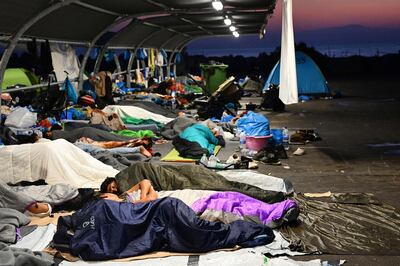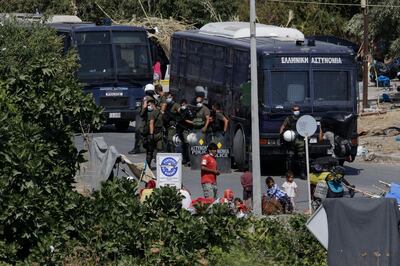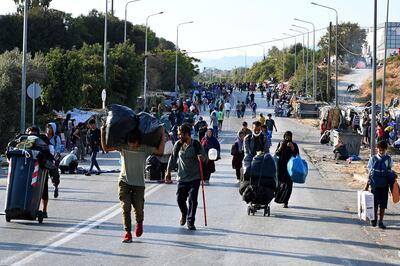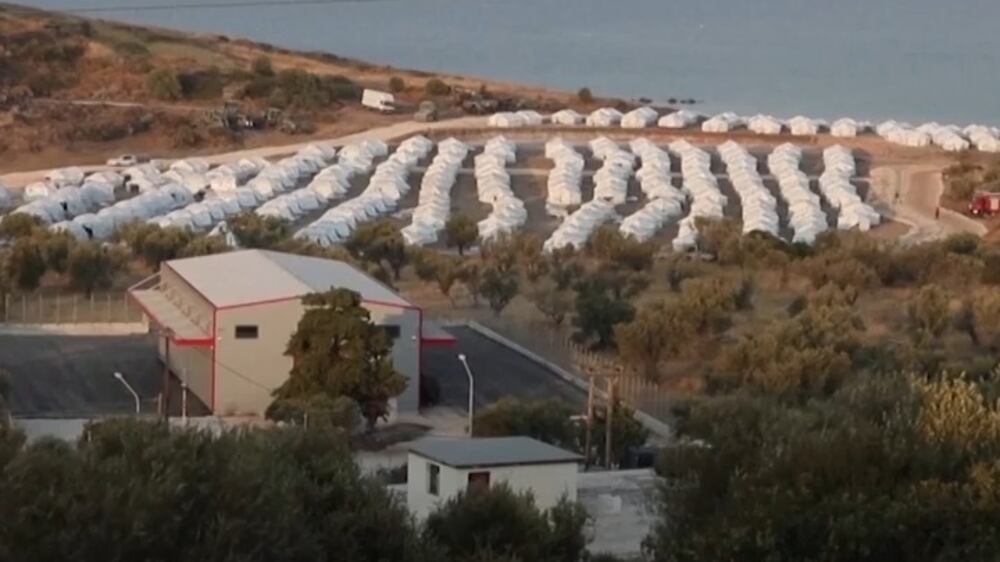The medical charity Doctors Without Borders has criticised the building of a new refugee camp on the island of Lesbos less than two weeks after a fire gutted the overcrowded Moria camp, which housed 12,000 residents.
The charity, known as MSF, called the move on the Aegean island a “system of containment”, as police began to move hundreds of migrants stranded there into a temporary tent camp on Thursday.
"We are extremely concerned by the construction of a new camp on Lesbos," Marco Sandrone, MSF co-ordinator on Lesbos, told The National.
"The system of containment on the islands has only led to suffering and disaster, and must not be replicated.
“While partial evacuations are welcome news, evacuating some people today only to rebuild a system of containment tomorrow cannot be sold by European states as a solution.
“In a few months we will again be faced with a new humanitarian crisis generating the same awful health consequences that we have been documenting for the past five years."

Thousands of migrants and refugees have been left homeless and stranded on Lesbos after a fire tore through Moria camp.
Authorities said the blaze, in which no one was hurt, was started by migrants.
Moria was the largest centre on the island for men, women and children arriving mainly on migrant routes that pass from the Middle East into Turkey and on to Europe.
The fire left the 12,000, most of them refugees from Afghanistan, Syria and African countries, without shelter, proper sanitation or access to food and water.
International organisations have long condemned conditions and overcrowding in Moria, which housed four times its capacity.
Greek police have started moving hundreds of migrants into the tent camp at Kara Tepe, near the island's port of Mytilene, which is ready to take at least 5,000 people.

But officials have said that some of the migrants were reluctant to move to the new camp because they hoped to leave the island.
"The operation will continue until all those who are on the streets are sheltered," a police official said.
About 70 female officers processed the migrants into the new camp, which was described as a public health initiative.
Police said 450 migrants had entered the camp so far. Of those, 250 had gone through rapid Covid-19 testing.
So far, 56 migrants of the 1,800 in the tent camp have tested positive.

Greek government ministers said authorities would continue "for some more days in good faith and communication" to convince the migrants to enter the new camp, expecting their transfer would be completed within a few days.
The UN’s refugee agency on Wednesday urged Greece to speed up asylum processes on Lesbos.
"The idea is not that people remain forever on the island of Lesbos, but that processes are accelerated so that people can leave gradually and in an orderly way" to the capital Athens or elsewhere on the mainland, said the UNHCR chief in Greece, Philippe Leclerc.
The Greek Police Minister, Michalis Chrysochoidis, this week said that half of the migrants on Lesbos should be able to leave "by Christmas" and "the rest by Easter".
Late on Tuesday, another camp of more than 4,700 people on the island of Samos was threatened by fire. Three migrants are being questioned by police over the incident.
The EU has said it is working with Greek authorities to build a camp to replace Moria, which the European Commission said would “significantly improve” conditions on Lesbos.
To help ease the pressure on local authorities after the inferno, Germany has said it will take another 1,500 refugees being held on Greek islands.
German authorities said the 408 families had their asylum claims accepted.
The German government had already agreed to accept 150 unaccompanied minors.







